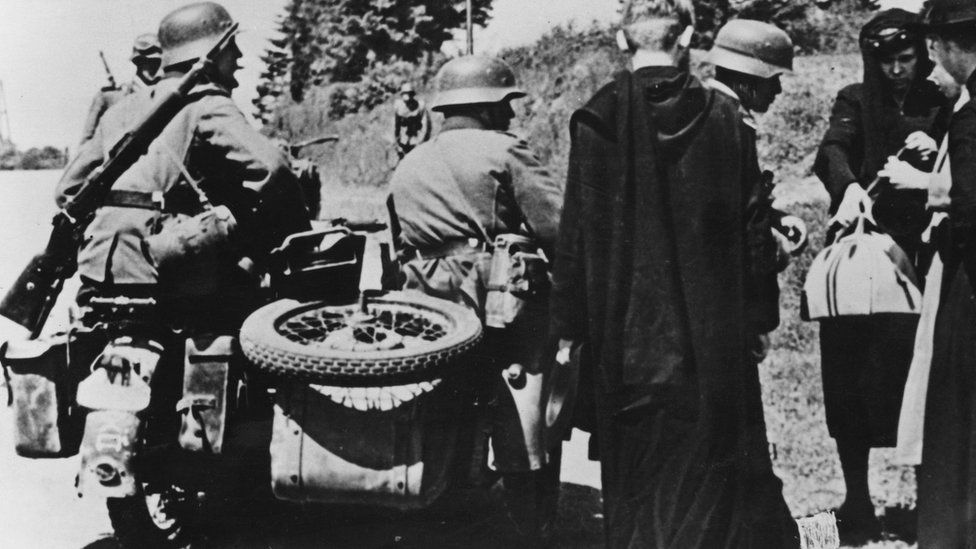Belgium concern as WW2 Nazis 'get German pensions'
- Published

A Belgian minister has voiced concern that Belgian former Nazi collaborators may still be receiving German pensions.
Belgian survivors of Nazi persecution appealed to the government to stop the payments, and Pensions Minister Daniel Bacquelaine "shares their indignation", his spokeswoman told the BBC.
But Germany manages the payments and "we have no official figures" for the recipients, Geraldine Lamoureux added.
Belgians who served in the SS were made Germans by an Adolf Hitler decree.
After the 1945 liberation, 57,000 Belgian collaborators were convicted.
The Memorial Group, lobbying the Belgian government, estimates that as many as 2,500 ex-collaborators are receiving German pensions.
The petition to stop the German pension payments was the group's initiative. They include Belgians who survived the Nazi camps and who want modern Belgium to remember the wartime occupation.
Belgians were recruited into the German Waffen SS and Wehrmacht, and collaborators also helped the Nazis to send Jews and resistance fighters to concentration camps.
The group's president, Pieter Paul Baeten, quoted by Belgian broadcaster RTBF, said: "It's sad. Belgium can't get hold of the information [on pension recipients], or doesn't want to.
"But I don't understand how, in today's Europe, Belgium and Germany can't manage to exchange this information."
It is not clear if those receiving the pensions are all living in Belgium.
The Memorial Group wants an official Belgian-German commission to be set up, to investigate the pensions and reveal who the recipients are.
Sheltered by Franco
Ms Lamoureux said the pensions minister "will discuss the matter with other ministers, to find a solution".
After the war Leon Degrelle, who led the Belgian collaborators under the Nazis, fled to fascist Spain, where he was sheltered by the Franco dictatorship and died in 1994.
Belgium sentenced him to death as a traitor, but he prospered in Spain, even after Franco's death and the rebirth of democracy in 1975.
A detailed investigation by Belgian historians concluded in 2007 that Belgian collaborators worked closely with Nazi officials to persecute Jews after the German invasion in 1940. Anti-Semitism was widespread in the Belgian establishment at the time, they said.
According to Mr Baeten - a survivor of Buchenwald concentration camp - Hitler gave Belgian SS members German nationality in 1941.
"The current German government is hiding behind that decree to avoid divulging information about its 'compatriots' to a 'foreign power', namely Belgium," he said.
German payments
In a parliamentary answer in 2012 the German government said it could not confirm the 2,500 figure for Belgian ex-collaborators alleged to be getting German pensions.
The government said only scrutiny of each individual's file could determine how many had served with Nazi military units, and those files were held by the German regional authorities.
When asked about the collaborators, it said (in German) 57 Belgians were getting German BVG ("Bundesversorgungsgesetz") maintenance payments, but did not explain who those Belgians were.
In 2012 the German government paid BVG allowances to 209,654 victims of the Nazis and their relatives, in Germany and abroad, but the amount was not specified.
Other German reparations for World War Two included payments to 58,932 Jews via two funds managed by the Jewish Claims Conference. The government said recipients were getting up to €300 (£236; $341) monthly from one fund, and up to €260 from the other.
- Published28 December 2015